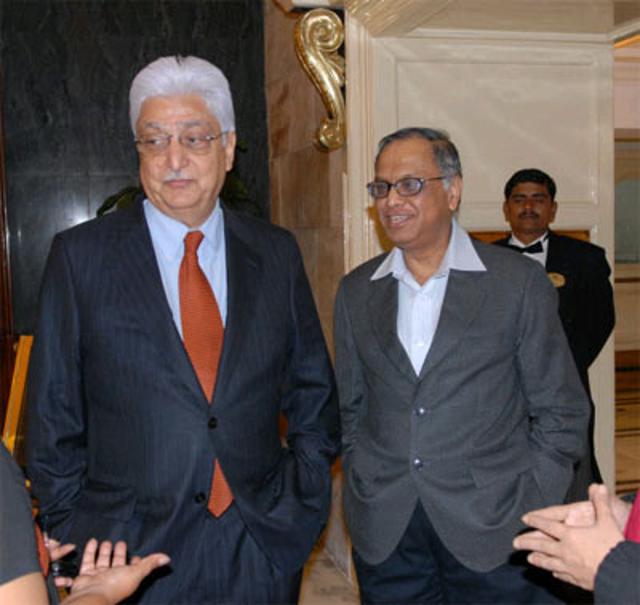
Bangalore, Aug 14: India's tech titans and fierce cross-town rivals, Wipro's Azim Premji and Infosys' N R Narayana Murthy, are squaring off in the burgeoning $3-billion e-commerce market space too. Premji has gone with the domestic players; he has investments in Myntra (recently acquired by Flipkart) and Snapdeal while Murthy has placed his bets on global e-tailing giant Amazon.
India's rapidly growing e-commerce market is turning out to be a two-horse race between Amazon and Flipkart.
Earlier this year, the Wipro chairman through his investment arm, Premji Invest, and a clutch of other investors, pumped in about $50 million in fashion e-tailer Myntra. Snapdeal, another e-commerce player, got $100 million in funding from five investors including Premji Invest.
More recently, Amazon and Murthy's family office, Catamaran Ventures, floated a JV to help small and medium businesses join the online bandwagon.
Catamaran holds a majority 51% in the JV—Taurus Business and Trade Services.
"Myntra and Snapdeal needed money and expertise from successful Indian entrepreneurs. From an investment perspective, Premji's investments are a more classic VC style investment that fosters local entrepreneurship with a very high risk-reward ratio," said Praveen Chakravarty, a successful angel investor and co-founder of Mumbai Angels. However, he has a counter view on the Amazon transaction. "It seems to me as a low-risk, financial return-focused yield investment that has risen out of an opportunity driven by regulations in India."
(Premji has gone with the domestic players; he has investments in Myntra and Snapdeal while Murthy has placed his bets on global e-tailing giant Amazon.)
Sources privy to developments in Amazon said that the US e-tailing behemoth was scouting for a big brand that could invest Rs 100 crore in cash with a guaranteed return on investment of around 20% at the time of exit. TOI could not ascertain the nature of the Amazon-Catamaran tie-up, as both parties have not disclosed the financials of the deal.
"Amazon doesn't need money nor does it need hand-holding and guidance," said a senior executive of a Bangalore-based VC fund-house, who requested anonymity as the subject was sensitive in his opinion.
Deepak Srinath, director—digital practice at Bangalore-based Allegro Capital Advisors, said comparisons between Premji and Murthy's venture is not like-to-like. "Having said that, it's easier to be a financial investor. But in the case of Catamaran, they are setting up full-scale operations and would be managing business operations. It's not easy to stick your neck out in this fashion which is a high-risk game in itself."
Aashish Bhinde of Avendus Capital said both Murthy and Premji have carved their own paths to align with players in the country's e-commerce play. When asked if Murthy's embraced a safe game plan with assured returns, while Premji's is a higher risk affair, Bhinde said he doesn't agree with those characterizations. "I believe they both are bullish about the sector but have different investment strategies. While one is taking a portfolio investment approach, the other has made a more strategic move," he added.
With Flipkart raising $1 billion in fresh funds and Amazon pouring $2 billion into the India market, many existing players could fall off the investors' radar paving the way for a two- or a three-way race between Amazon, Flipkart and Snapdeal in India. So far, Flipkart has raised close to about $1.7 billion from a clutch of investors as it fights Amazon and Snapdeal in a fast-growing e-commerce market. India has 243 million internet users, and this number continues to grow rapidly due to increased smartphone penetration.
Higher disposable incomes and internet connectivity are pushing the Indian middle class to shop online. The two IT czars are fighting it out in an e-commerce market that's expected to touch $32 billion by the end of this decade.





Comments
Add new comment